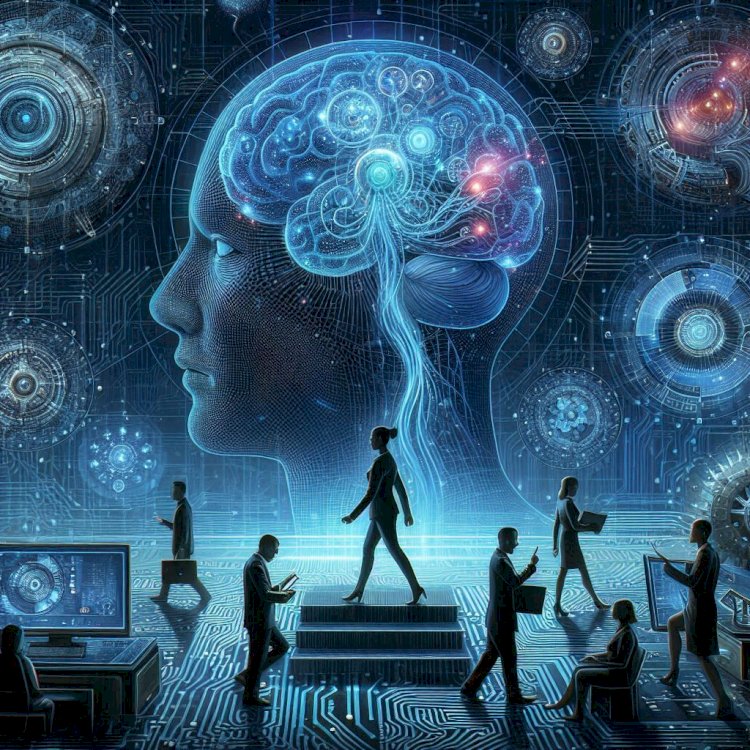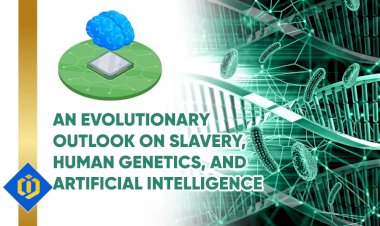The Rise of Algorithmic Intelligence: Understanding the Shift in Human Cognition and Control

The development of Artificial Intelligence (AI) has ushered in a new era of technological advancement, dramatically altering the way we interact with machines and perceive intelligence. Once seen as the domain of science fiction, AI has now become a tangible force capable of performing tasks that were once exclusively in the realm of human capability. With AI systems evolving rapidly, many are beginning to question whether these algorithms will soon surpass human intellect and whether we, as humans, will be able to maintain control over these powerful machines. In this article, we delve into the nature of AI, its superiority in specialized domains, and the critical challenges surrounding human control as AI technology continues to advance.
The Algorithmic Brain: A New Form of Intelligence
AI operates on a fundamentally different architecture than human cognition. While human intelligence is shaped by a combination of innate biology and experience, AI intelligence is entirely artificial and relies on algorithms—complex sets of instructions designed to perform specific tasks. The "algorithmic brain" refers to the neural networks and deep learning models that power AI. These networks, modeled loosely on the human brain, can process vast amounts of data far more quickly than a human ever could.
Unlike human cognition, which is influenced by emotions, biases, and subjective experiences, AI is purely logic-based. It can access and analyze enormous datasets, identify patterns, and generate predictions with incredible speed and accuracy. In fields such as medical diagnostics, financial analysis, and autonomous vehicles, AI has demonstrated a capacity to outperform human specialists. This specialized superiority is what makes the algorithmic brain so potent in certain contexts.
Superiority in Specialized Fields: AI’s Edge Over Humans
The superiority of AI becomes most evident when considering its performance in specific tasks. AI systems have shown remarkable success in fields like healthcare, where deep learning algorithms can detect diseases from medical images more accurately than human doctors. In finance, AI can analyze massive amounts of market data to identify trends and forecast market movements with precision that surpasses human analysts. Even in highly strategic games like chess and Go, AI has defeated world champions, revealing its ability to process millions of moves in seconds and select the optimal strategy.
This expertise in specialized fields is what gives AI its edge. While humans possess the flexibility to think abstractly and adapt to new challenges across various domains, AI excels at mastering narrow tasks with efficiency and accuracy that is unmatched. However, as AI becomes increasingly sophisticated, the question arises: can humans maintain control over these systems that outstrip our own abilities?
The Dilemma of Control: Navigating the AI Conundrum
As AI technology advances, the ability for humans to retain control over these systems is becoming a more pressing concern. AI algorithms are designed to improve over time through self-learning processes, adapting to new information and refining their methods without direct human input. This autonomy can be beneficial in some contexts, but it also presents significant risks. The more independent AI becomes, the more difficult it is to ensure that its actions align with human values and ethics.
Consider autonomous weapons or surveillance systems powered by AI: once deployed, these machines could make decisions without human intervention, potentially leading to unforeseen consequences. Even in areas like law enforcement and criminal justice, where AI-driven algorithms are used to assess risk and make decisions about sentencing or parole, the opacity of these systems raises concerns about fairness and accountability.
The ability to "turn off" AI or intervene in its decision-making processes is increasingly limited as these systems become more embedded in critical infrastructure. Ensuring that AI operates within ethical boundaries and is governed by human oversight will be one of the greatest challenges of the coming years.
The Future of AI: Collaboration or Competition?
While it is clear that AI is rapidly gaining ground in many specialized tasks, it is unlikely that AI will completely replace human intelligence. Rather, the future of AI lies in collaboration. AI has the potential to augment human intelligence, acting as a tool that enhances our decision-making capabilities and allows us to tackle problems that were previously out of reach.
For instance, AI can help doctors make more accurate diagnoses by processing medical data faster than humans, while leaving the final decision-making in the hands of healthcare professionals. Similarly, AI could assist researchers in analyzing data patterns to solve complex problems like climate change or disease prevention. In this way, AI and human intelligence can work together to create innovative solutions and unlock new possibilities.
However, ensuring that AI remains a collaborative tool rather than a competitor will require rigorous oversight and a commitment to ethical AI development. Governments, companies, and research institutions will need to collaborate to create frameworks that prioritize human values, accountability, and transparency in AI deployment.
Conclusion: Charting the Path Forward for Human-AI Interaction
As AI continues to evolve, its implications for humanity are vast and complex. The algorithmic brain is becoming more powerful, efficient, and capable of tasks once thought to be exclusively human. However, the need for human oversight and control remains paramount. The future will not be about AI replacing human intelligence, but about harnessing AI to complement human strengths and tackle challenges in new ways.
The balance between innovation and control will define how AI shapes our world. By fostering a responsible approach to AI development, we can ensure that these systems remain beneficial to society and aligned with human interests. As we move into this new era of artificial intelligence, we must remain vigilant in maintaining our role as stewards of the technology we have created.
For tailored advice and insights into Abu Dhabi’s real estate opportunities, consider consulting A Land or exploring the latest property articles on A Land Blog or A Land News. You can also read the original article that inspired this post here through this link.

 content-team
content-team 


















